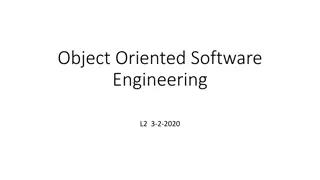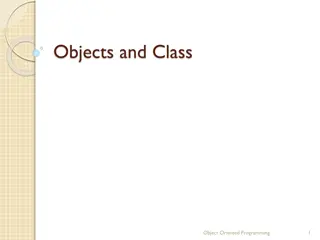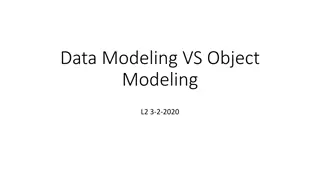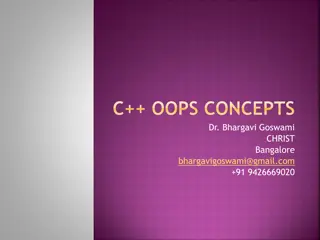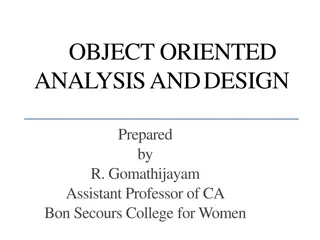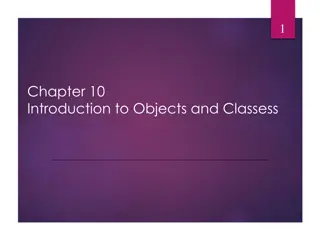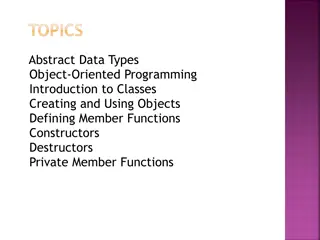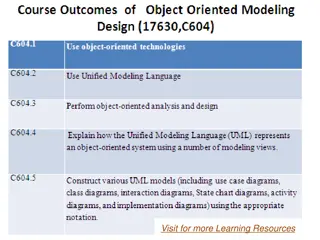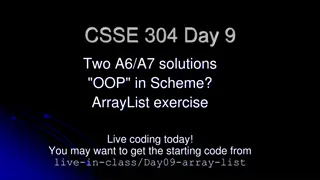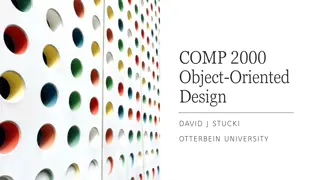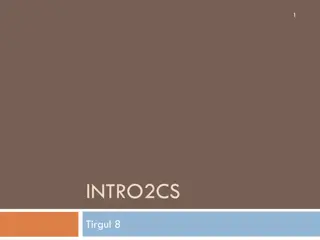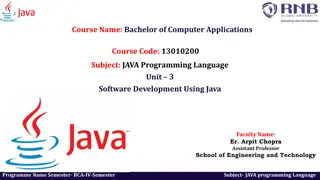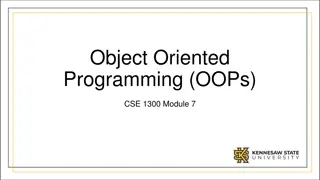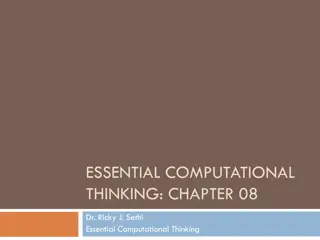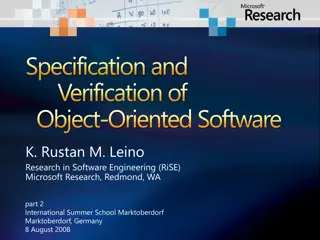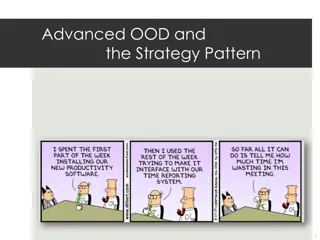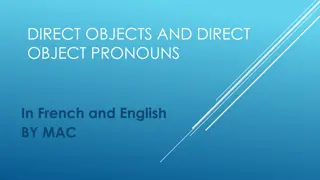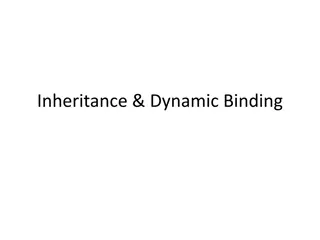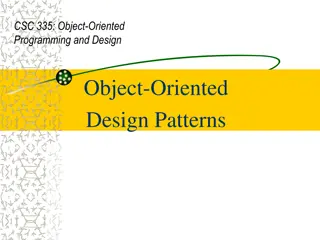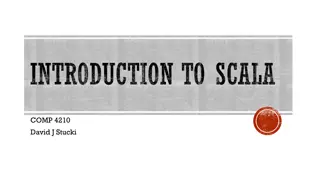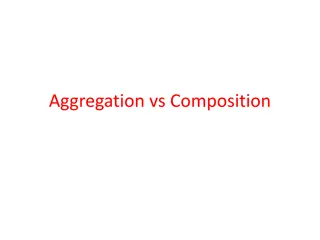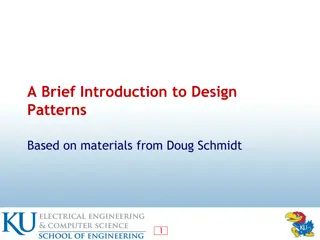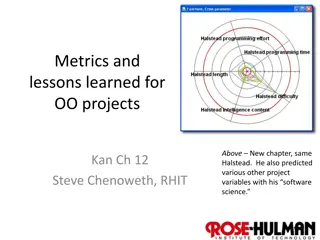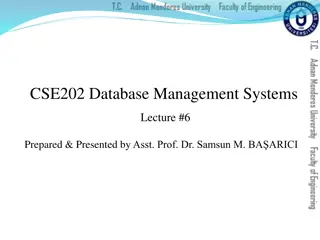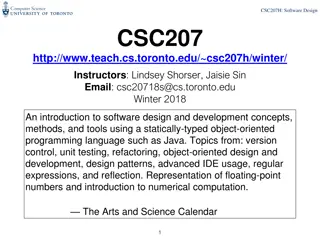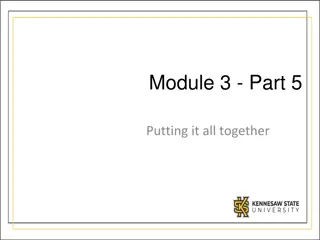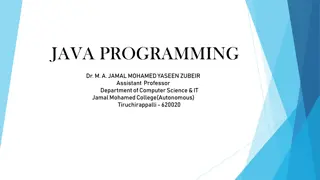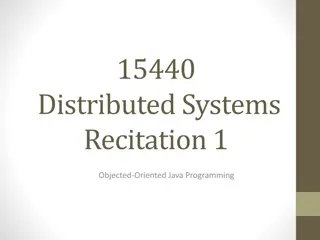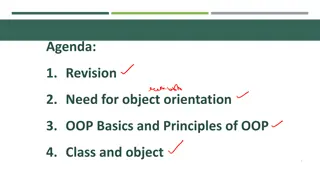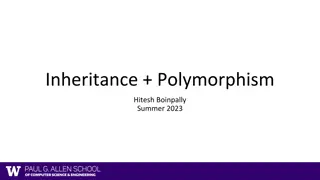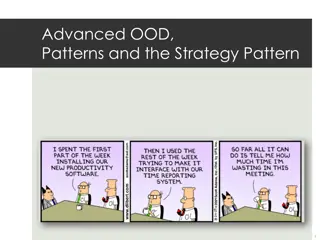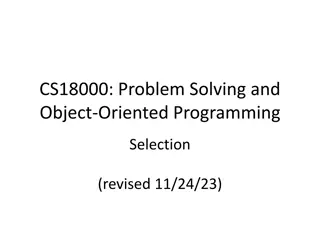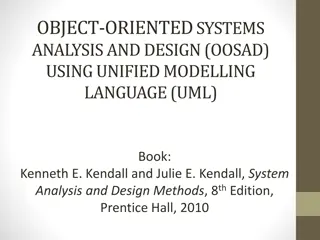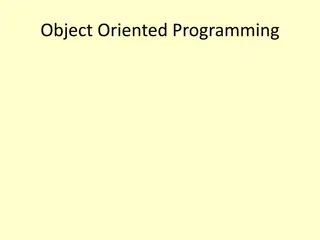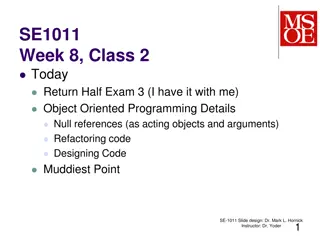Object-Oriented Software Engineering Principles
Explore the concepts of inheritance, generalization/specialization, UML representation, object/class relationships, multiplicity notations, and aggregation in object-oriented software engineering. Learn how methods and attributes can be inherited, grouped, and reused among classes, and understand th
0 views • 30 slides
Object-Oriented Programming Concepts
Object-oriented programming enables the effective development of large-scale software and GUIs by defining classes to represent entities in the real world as objects with unique identities, states, and behaviors. Objects have data fields representing their properties and methods defining their actio
2 views • 70 slides
Data Modeling vs Object Modeling
Data modeling involves exploring data-oriented structures, identifying entity types, and assigning attributes similar to class modeling in object-oriented development. Object models should not be solely based on existing data schemas due to impedance mismatches between object and relational paradigm
0 views • 17 slides
Object-Oriented Programming (OOP) in Python
Python is a versatile programming language that supports various programming approaches. Object-Oriented Programming (OOP) is a popular method in Python where objects are created to solve programming problems. OOP in Python focuses on creating reusable code, following the principle of DRY (Don't Rep
2 views • 35 slides
Object-Oriented Programming Concepts in C++
Exploring C++ Object-Oriented Programming concepts with Dr. Bhargavi Goswami from CHRIST Bangalore. Dive into software crisis management, syllabus recommendations, topic lists, and issues to address in system design and software development. Uncover facts, reports, and a discussion on the delivery c
1 views • 38 slides
Object-Oriented Analysis and Design (OOAD)
Object-oriented analysis and design (OOAD) is a software engineering approach that models systems as groups of interacting objects. OOAD involves analyzing, designing, and implementing software solutions based on objects and emphasizes logical solutions. It focuses on understanding and defining conc
0 views • 25 slides
Object-Oriented Programming Concepts
Object-oriented programming (OOP) is a powerful paradigm that helps in organizing and designing programs effectively. This summary covers key aspects such as designing a program, top-down structured design, the importance of OOD, defining objects, identity, state, behavior in OOP, and examples of st
2 views • 18 slides
Introduction to Object-Oriented Programming and Data Abstraction
Introduction to object-oriented programming concepts including classes, objects, member functions, constructors, destructors, and abstract data types. Exploring the principles of abstraction in software development, passing objects to functions, and understanding the limitations of procedural progra
0 views • 47 slides
Object Modeling in Software Development
Object modeling is a crucial concept in software development, capturing the static structure of a system by depicting objects, their relationships, attributes, and operations. This modeling method aids in demonstrating systems to stakeholders and promotes a deeper understanding of real-world entitie
1 views • 65 slides
Object-Oriented Programming Concepts Illustrated
Learn about creating and working with arrays, defining functions, and building classes in an object-oriented programming context. Dive into examples like creating arrays of objects, defining arrays with pointers, and designing classes for a publishing company that markets books and audio cassettes.
5 views • 24 slides
Object-Oriented Programming in Scheme
The content discusses implementing object-oriented programming concepts in Scheme, focusing on encapsulation through fields and methods. It explores representing objects and manipulating fields exclusively through methods. The tutorial covers creating objects, defining methods, and accessing fields
2 views • 13 slides
Object-Oriented Design Principles
Explore the core concepts of object-oriented design, including objects, classes, and the object-oriented paradigm. Learn about the relationship between objects and classes, and how they form the building blocks of software development. Gain insights into class components, attributes, and methods, an
0 views • 18 slides
Configuration Examples for IP SLA with Object Tracking
Learn how to configure and troubleshoot IP SLA with Object Tracking using detailed examples for Static Routing, HSRP, and Policy Based Routing. Find out where Object Tracking can be implemented and when not to use it in various network scenarios. Understand the configuration components, including de
2 views • 17 slides
Introduction to Object-Oriented Programming in CS with RPG Example
Today's session focuses on introducing Object-Oriented Programming (OOP) and its concepts through a Role-Playing Game (RPG) example. The content covers the transition from Procedural Programming to OOP, encapsulating data in objects, and practical implementation with a hero, goblin, and multiple mon
0 views • 46 slides
Java Programming: BCA IV Semester Course Overview
This Bachelor of Computer Applications (BCA) course focuses on Java programming language fundamentals, object-oriented concepts, software development principles, and practical application skills. Students will learn to define Java program features, implement object-oriented features, work with array
0 views • 31 slides
Object-Oriented Programming (OOP) in Python
Object-Oriented Programming (OOP) is a programming paradigm that focuses on organizing code into objects with attributes and behaviors. Python supports various OOP concepts such as classes, objects, inheritance, polymorphism, abstraction, and encapsulation. Classes serve as blueprints for creating o
2 views • 29 slides
Object-Oriented Programming (OOP) Concepts in Chapter 8
Delve into the world of Object-Oriented Programming (OOP) through Chapter 8 of 'Essential Computational Thinking' by Dr. Ricky J. Sethi. Explore how classes and objects form the backbone of OOP, how messages are sent between objects, and the difference between regular and object reference variables.
0 views • 29 slides
Specification and Verification of Object-Oriented Software in Research and Education
Explore the principles and methods for specifying and verifying object-oriented software, covering concepts like loop invariants, termination conditions, mutual exclusion, procedures, and more.
0 views • 25 slides
Advanced Object-Oriented Design and the Strategy Pattern
Delve into the intricate world of Object-Oriented Design (OOD) with a focus on the Strategy Pattern. Explore the fundamental principles of OOD, such as encapsulation, abstraction, and the Single Responsibility Principle. Discover how objects interact through messages and how to ensure each class has
0 views • 22 slides
Direct Objects and Direct Object Pronouns in English and French
Explore the concepts of direct objects and direct object pronouns in English and French languages. Learn how direct objects are used in sentences, the role of direct object pronouns in avoiding repetition, and the differences in sentence structure when using object pronouns in French. Discover commo
1 views • 24 slides
Inheritance and Dynamic Binding in Object-Oriented Programming
Explore the concepts of inheritance and dynamic binding in Object-Oriented Programming. Learn how subclasses inherit attributes and methods from parent classes and how dynamic binding allows for method overriding. Discover how to implement these concepts in classes like USBFlashDrive, Computer, and
0 views • 15 slides
Overview of Object-Oriented Design Patterns in Software Development
In the realm of software development, object-oriented design patterns play a crucial role in structuring code and solving recurring problems efficiently. These patterns, as outlined in various influential books and resources, provide a systematic approach to design, encompassing aspects like object
0 views • 26 slides
Scala: A Multi-Paradigmatic Language
Scala is a powerful language designed by Martin Odersky that seamlessly blends object-oriented and functional programming paradigms. With origins in the 1930s and a release in 2004, Scala runs on the JVM, offering features like type inference, first-class functions, and full object orientation. Its
0 views • 9 slides
The Difference Between Aggregation and Composition in Object-Oriented Programming
Aggregation and Composition are two important concepts in object-oriented programming. Aggregation refers to a 'has-a' relationship where the contained object can survive independently, while Composition indicates that the member object is part of the containing class and cannot exist separately. Th
0 views • 15 slides
Design Patterns in Object-Oriented Design
Design patterns in object-oriented design (OOD) are essential templates that codify best practices for solving common problems. They help streamline development by capturing proven design decisions, promoting code reuse, and enhancing system flexibility and modularity. Learn about the core concepts,
0 views • 20 slides
Metrics and Lessons Learned for Object-Oriented Projects
This chapter discusses various metrics and lessons learned for object-oriented projects, including the use of major OO metrics, Lorenz's metrics, IBM's Object Oriented Technology Council recommendations, and the CK metrics suite. The CK metrics suite covers six OO design and complexity measures, suc
0 views • 17 slides
Computer Programming Principles
Dive into the world of computer programming, covering high-level and machine languages, compilers, interpreters, writing programs, top-down design, and the array of programming languages available. Understand the essentials of building code to control computers, the diversity of programming language
0 views • 23 slides
Object-Oriented Database Concepts and Limitations in Relational Models
Object-oriented database concepts are introduced as an alternative to relational models, addressing limitations such as lack of support for complex data structures, generalization, specialization, and aggregation. The shift towards a more data-centric approach in information systems development is d
1 views • 82 slides
CSC207H Software Design Course Overview
Winter 2018's CSC207H Software Design course focuses on software design and development concepts, methods, and tools using Java. The course covers topics like version control, unit testing, refactoring, object-oriented design, design patterns, and more. Students are expected to spend 8-10 hours per
0 views • 30 slides
Object-Oriented Programming Concepts and Polymorphism Using Java and C#
Explore key Object-Oriented Programming concepts like inheritance, method overriding, abstract classes, interfaces, and polymorphism through examples in Java and C#. Delve into class structures, casting, and handling different object types at runtime. Learn how to effectively utilize these principle
0 views • 12 slides
Fundamentals of Object-Oriented Programming in Java
Object-Oriented Programming (OOP) is a methodology that simplifies software development by using classes and objects. This paradigm includes concepts like Object, Class, Inheritance, Polymorphism, Abstraction, and Encapsulation. Other terms used in OOP design include Coupling, Cohesion, Association,
0 views • 54 slides
Object-Oriented Java Programming Concepts
Explore the fundamentals of object-oriented programming in Java, covering topics such as user-defined classes, inheritance, polymorphism, abstract classes, and interfaces. Learn about packages, encapsulation, access modifiers, overloading methods, and more to enhance your Java programming skills.
0 views • 17 slides
Coding Challenges and Object-Oriented Design Concepts
This content covers coding challenges related to determining divisibility of numbers, checking equality of rows in a 2D array, and a multiple-choice question on object-oriented program design. It also includes an AP-style question testing ArrayList operations. Additionally, it provides insights on h
0 views • 7 slides
Introduction to Object Orientation and OOP Principles
Understanding the basics of Object-Oriented Programming (OOP) is crucial in modern software development. The agenda covers revision, the need for object orientation, principles, classes, and objects. Questions and assignments provide practical scenarios to apply OOP concepts effectively.
0 views • 20 slides
Inheritance and Polymorphism in Object-Oriented Programming
Inheritance allows classes to form hierarchical relationships, facilitating code sharing and reuse. Superclasses are extended by subclasses, which inherit their behavior. This relationship creates an "is-a" connection, such as Tiger extending Cat. Polymorphism, demonstrated through a set of classes
0 views • 11 slides
Object-Oriented Design Principles and Subtyping in Java
Explore the concepts of object-oriented design, patterns, and the strategy pattern. Learn how to translate user stories into classes and implement them in Java. Delve into the theory of Is-A, Has-A, and Can-Do relationships, and understand the importance of subtyping and supertyping in creating flex
0 views • 21 slides
Problem Solving and Object-Oriented Programming Selection
This content covers topics such as the if statement, booleans, relations, selection statements, sequential execution, control structures, decision making, primitive type boolean review, and comparing strings in the context of problem-solving and object-oriented programming. It explains concepts like
0 views • 56 slides
Object-Oriented Systems Analysis and Design (OOSAD) Using Unified Modeling Language (UML)
Explore the fundamentals of object-oriented analysis and design using UML, a powerful tool for constructing and visualizing systems. Learn about object-oriented concepts, classes, inheritance, UML diagrams, use case modeling, activity and sequence diagrams, and more. Discover how UML can enhance the
0 views • 144 slides
Object-Oriented Programming Concepts
Learn about essential Object-Oriented Programming concepts such as classes, instances, encapsulation, and abstraction. See how OOP allows for a clear and concise representation of objects in a program while hiding unnecessary details and managing data access through methods. Dive into the world of O
0 views • 17 slides
Object-Oriented Programming: Class 2 Recap and Muddiest Points Discussion
Today's class delved into object-oriented programming, null references, refactoring code, and designing code. We reviewed static classes and discussed the ins and outs of using "this" and "other" in programming. The muddiest points included understanding the behavior of null objects, short-circuit o
1 views • 9 slides
